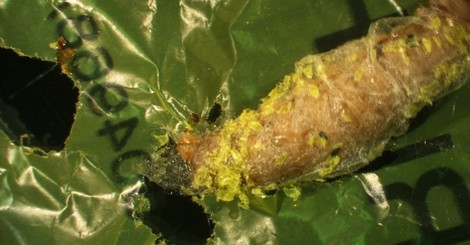Your podcast discovery platform
Curious minds select the most fascinating podcasts from around the world. Discover hand-piqd audio recommendations on your favorite topics.

piqer for: Climate and Environment Global finds Globalization and politics
I'm a freelance journalist, currently based in Madrid. I used to be a News Producer at CNBC in London before, but I thought a little bit more sun might do me good. Now I write for several news organizations, covering a range of topics, from Spanish politics and human rights for Deutsche Welle to climate change for La Marea.
The Plastic-Eating Caterpillar Is Not The Solution
Plastic pollution is one of the many serious threats humans pose to the environment. We produce around 300 million tons per year, and we recycle around 10%, so lots and lots of plastic end up in nature. This is becoming a serious problem: according to the Plastic Pollution Coalition, by 2050 there will be more plastic than fish in the oceans. And we already have the Great Pacific garbage patch, which occupies a huge area in the North Pacific Ocean.
The problem with plastic is that what makes it great, makes it awful too. Let me explain myself. We use plastic because it's cheap and extremely durable and stable. From shopping bags to spaceships, plastic is something you can rely on: if you use it appropriately, it won't spoil. However, this durability and stability is its own curse: it doesn't naturally degrade, which makes it an extremely resistant pollutant.
This week, I've seen a plethora of news on a caterpillar which, allegedly, can digest plastic. I've seen it everywhere, from Science magazine to the BBC.
Science is usually slow and disappointing. Things don't usually happen overnight, and we, the press, tend to magnify them with our enthusiasm and eagerness for quick change. So I was skeptical of this wonder: too good to be true? Ed Yong calls a spade a spade.
Just like a scientist, Yong has checked all sides, and explained what good we can expect from the mighty plastic-eating worm. He has also explained a lot about plastic without getting boring or excessively alarming, and used a personal story to illustrate the scientific method. He has gone to several sources and put the findings in the right context with links and data. What else can you ask for?
So, no, we aren't likely to solve our plastic problem through truckloads of worms. But we are one step closer to solving it. It's a shame that when that happens, it will probably not be on everybody's Facebook feed.

once again a great article by ed yong. earlier he covered "plastic-eating" bacteria, which are - just as the caterpillars - not"the solution" to problems caused by us. but they contribute... i covered them too, here > http://schaechter.asmb...
I personally hope that there is a solution out there, some enzyme that can degrade plastic without any downsides, but I doubt it. And I worry that stories like the one about the bacteria or the worm being able to digest plastic will stay in the back of people's heads and the next time they have to decide whether to take that plastic bag or not they'll think 'whatever, the solution is around the corner either way, so I'll take two plastic bags'. Because if there won't be a solution, every plastic bag is one too much...